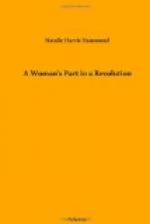January 6.—The Government issues an ultimatum: Johannesburg must lay down its arms.
The letter of invitation signed by Messrs. Charles Leonard, Francis Rhodes, Lionel Phillips, John Hays Hammond and George Farrar, inviting Dr. Jameson to come to the succour of Johannesburg under certain contingencies, was printed in this morning’s paper. It was picked up on the battlefield, in a leathern pouch, supposed to be Dr. Jameson’s saddle-bag. Why in the name of all that is discreet and honourable didn’t he eat it!
Two messengers from the High Commissioner, Sir Jacobus de Wet, the British Agent, and Sir Sydney Shippard, were received by the Reform Committee this morning. De Wet told them that Johannesburg must lay down its arms to save Jameson and his officers’ lives; that unless they complied with this appeal, which he made on behalf of the High Commissioner, who was in Pretoria ready to open negotiations, Johannesburg would be responsible for the sacrifice of Jameson and his fellow prisoners. It would be impossible for the Government to conduct negotiations with the High Commissioner for redress of grievances until arms were laid down. He urged them to comply with this appeal to prevent bloodshed, and promised that they could depend upon the protection of the High Commissioner, and that not ’a hair of their heads would be touched.’ After much discussion, the Committee agreed to lay down their arms.
Betty and Mrs. Clement were busy all the morning giving out books and flowers which had been generously sent by various ladies and commercial firms for distribution among the women and children at the Wanderers’ and Tattersall’s. Betty says the women were most grateful. They are busy, hard-working women, and the enforced leisure is very trying to them. She spoke with the manager of Tattersall’s; he thanked her for her gifts, remarking, with some weariness in his tone: ’You don’t know, Miss, how hard it is to keep the women amused and contented—and several of them have been confined!’ as if that, too, were a proof of insubordination.
My husband tells me that the Committee is to hold a meeting at midnight, and another at six to-morrow morning. He says that Lionel Phillips nearly fainted from exhaustion to-day. Mr. Phillips is consistent and brave, and George Farrar, too, is proving himself a hero. Dear old Colonel, with the kind thoughtfulness so characteristic of him, never fails to ask how we are bearing the trial.
January 7.—Sir Jacobus de Wet and Sir Sydney Shippard addressed the populace from the Band Club balcony, exhorting them to accept the ultimatum.
Later.—I have had such a reassuring conversation with Sir Sydney Shippard this evening. He is a most intelligent man, and speaks with such fluent decisiveness that all he says carries conviction. I am told that Sir Jacobus’s speech was a rambling, poor affair and weak; the crowd showed a restlessness that at one time threatened to become dangerous. He was fortunately pulled down by his coat-tails before the crowd lost self-control.




